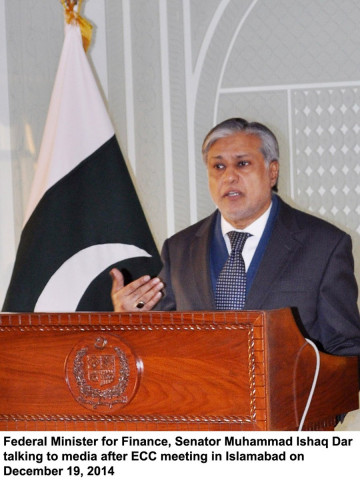ECC approves fifth mini budget, imposes 2.5% regulatory duty on petroleum products
Also approves Ramazan package worth Rs1.5b

Finance Minister Ishaq Dar. PHOTO: PID
In the Economic Coordination Committee (ECC) meeting held in Islamabad on Thursday, the government decided to raise GST rate on High Speed Diesel from 32% to 34%, while tax on motor spirit, kerosene oil, light diesel oil and HOBC was also increased from 18% to 20%, said an official of the Federal Board of Revenue (FBR).
The latest mini-budget has been introduced just a day before the government is scheduled to begin negotiations with the International Monetary Fund (IMF) for release of the next loan tranche worth over $500 million. Additionally, the fiscal budget for 2015-2016 is expected in two months.
The government has already levied 5% regulatory duty on furnace oil to recoup revenue losses.
Further, the ECC allowed the levy of 2% regulatory duty on petroleum crude oil, motor oil and furnace oil.
Moreover, imposition of 2.5% regulatory duty on high speed diesel was also approved in the meeting.
Both regulatory duties would come into effect from June 1, with the step aimed at recouping some of the revenue losses due to persistent drop in price of petroleum products in the current financial year.
Thursday's move, however, contradicts the government’s previously stated stance on altering petroleum prices.
Finance Minister Ishaq Dar had publicly claimed that any change in petroleum prices would cost the exchequer Rs68 billion in lost revenues. To offset the loss, the government had through the last four mini-budgets slapped over Rs100 billion worth of taxes.
Sources in the FBR told The Express Tribune that the tax machinery was crumbling due to unchecked corruption – a reality that the government was not ready to accept.
Read: Labelled ‘petroleum product’: LNG prices to be revised every month, says ECC
Iftikhar Vohra, the President Karachi Chamber of Commerce and Industry, had claimed last week that the FBR was setting tax notices in return for Rs50,000 to Rs300,000 worth of kickbacks.
The FBR has not denied these allegations.
However, it insisted that the increase in GST rates and regulatory duties would generate only Rs10 billion revenues in the last two months of the current fiscal year which ends in July. The claim seems highly susceptible as the government has history of misleading Parliament on the issue of actual impact of mini-budgets.
Dar had told the Parliament that the four mini-budgets would generate Rs48 billion in revenue. However, in a report to the IMF, the government said that additional measures in these mini-budgets would only generate revenues equal to 0.35% of the GDP, i.e. Rs101 billion.
ECC approves Ramazan package worth Rs1.5b
The ECC also approved a Ramazan package worth Rs1.5 billion, Rs100 million more than the amount approved in 2014.
Dar said the government had allowed special price relaxation, despite a fall in prices owing to lower inflation.
As part of the package, the finance division will pay Rs1 billion to the Utility Stores Corporation upfront for buying the essential items before Ramazan. These items include flour, sugar, ghee/oil, pulses, dates, rice, tea, milk and spices, among others.
PIA fleet payments
The ECC also approved the release of the remaining $35.96 million for 15 aircrafts which had been secured on dry lease for PIA.
In its December 6, 2014, meeting, the ECC had approved in principle an amount of $52 million and provision of $16.44 million as the first tranche for the aircrafts. The PIA has secured 10 A-320 and 5-ATR-72 aircrafts on dry lease.



















COMMENTS
Comments are moderated and generally will be posted if they are on-topic and not abusive.
For more information, please see our Comments FAQ